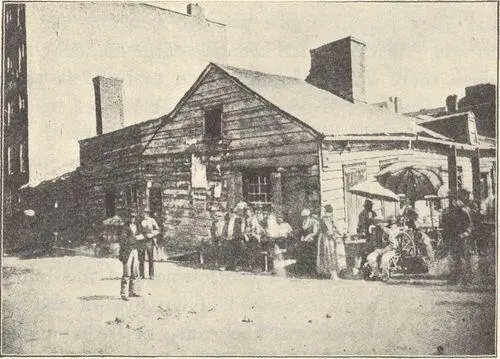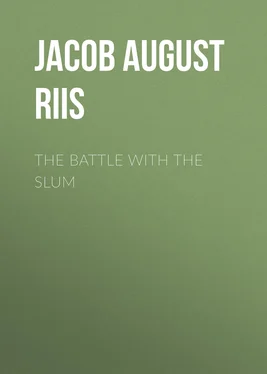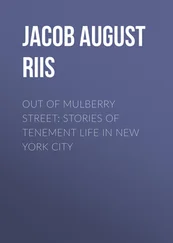Jacob August Riis - The Battle with the Slum
Здесь есть возможность читать онлайн «Jacob August Riis - The Battle with the Slum» — ознакомительный отрывок электронной книги совершенно бесплатно, а после прочтения отрывка купить полную версию. В некоторых случаях можно слушать аудио, скачать через торрент в формате fb2 и присутствует краткое содержание. Жанр: foreign_prose, sociology_book, foreign_antique, на английском языке. Описание произведения, (предисловие) а так же отзывы посетителей доступны на портале библиотеки ЛибКат.
- Название:The Battle with the Slum
- Автор:
- Жанр:
- Год:неизвестен
- ISBN:нет данных
- Рейтинг книги:3 / 5. Голосов: 1
-
Избранное:Добавить в избранное
- Отзывы:
-
Ваша оценка:
- 60
- 1
- 2
- 3
- 4
- 5
The Battle with the Slum: краткое содержание, описание и аннотация
Предлагаем к чтению аннотацию, описание, краткое содержание или предисловие (зависит от того, что написал сам автор книги «The Battle with the Slum»). Если вы не нашли необходимую информацию о книге — напишите в комментариях, мы постараемся отыскать её.
The Battle with the Slum — читать онлайн ознакомительный отрывок
Ниже представлен текст книги, разбитый по страницам. Система сохранения места последней прочитанной страницы, позволяет с удобством читать онлайн бесплатно книгу «The Battle with the Slum», без необходимости каждый раз заново искать на чём Вы остановились. Поставьте закладку, и сможете в любой момент перейти на страницу, на которой закончили чтение.
Интервал:
Закладка:
If any one believes this to be needless alarm, let him think a moment. Government by the people must ever rest upon the people's ability to govern themselves, upon their intelligence and public spirit. The slum stands for ignorance, want, unfitness, for mob-rule in the day of wrath. This at one end. At the other, hard-heartedness, indifference, self-seeking, greed. It is human nature. We are brothers whether we own it or not, and when the brotherhood is denied in Mulberry Street we shall look vainly for the virtue of good citizenship on Fifth Avenue. When the slum flourishes unchallenged in the cities, their wharves may, indeed, be busy, their treasure-houses filled,—wealth and want go so together,—but patriotism among their people is dead.
As long ago as the very beginning of our republic, its founders saw that the cities were danger-spots in their plan. In them was the peril of democratic government. At that time, scarce one in twenty-five of the people in the United States lived in a city. Now it is one in three. And to the selfishness of the trader has been added the threat of the slum. Ask yourself then how long before it would make an end of us, if let alone.
Put it this way: you cannot let men live like pigs when you need their votes as freemen; it is not safe. 2 2 "The experiment has been long tried on a large scale, with a dreadful success, affording the demonstration that if, from early infancy, you allow human beings to live like brutes, you can degrade them down to their level, leaving them scarcely more intellect, and no feelings and affections proper to human hearts."— Report on the Health of British Towns.
You cannot rob a child of its childhood, of its home, its play, its freedom from toil and care, and expect to appeal to the grown-up voter's manhood. The children are our to-morrow, and as we mould them to-day so will they deal with us then. Therefore that is not safe. Unsafest of all is any thing or deed that strikes at the home, for from the people's home proceeds citizen virtue, and nowhere else does it live. The slum is the enemy of the home. Because of it the chief city of our land came long ago to be called "The Homeless City." When this people comes to be truly called a nation without homes there will no longer be any nation.
Hence, I say, in the battle with the slum we win or we perish. There is no middle way. We shall win, for we are not letting things be the way our fathers did. But it will be a running fight, and it is not going to be won in two years, or in ten, or in twenty. For all that, we must keep on fighting, content if in our time we avert the punishment that waits upon the third and the fourth generation of those who forget the brotherhood. As a man does in dealing with his brother so it is the way of God that his children shall reap, that through toil and tears we may make out the lesson which sums up all the commandments and alone can make the earth fit for the kingdom that is to come.
CHAPTER I
BATTLING AGAINST HEAVY ODDS
The slum I speak of is our own. We made it, but let us be glad we have no patent on the manufacture. It is not, as one wrote with soul quite too patriotic to let the Old World into competition on any terms, "the offspring of the American factory system." Not that, thank goodness! It comes much nearer to being a slice of original sin which makes right of might whenever the chance offers. When to-day we clamor for air and light and water as man's natural rights because necessary to his being, we are merely following in the track Hippocrates trod twenty-five centuries ago. How like the slums of Rome were to those of New York any one may learn from Juvenal's Satires and Gibbon's description of Rome under Augustus. "I must live in a place where there are no fires, no nightly alarms," cries the poet, apostle of commuters. "Already is Ucalegon shouting for water, already is he removing his chattels; the third story in the house you live in is already in a blaze. You know nothing about it. For if the alarm begin from the bottom of the stairs, he will be the last to be burned whom a single tile protects from the rain where the tame pigeons lay their eggs." (Clearly they had no air-shafts in the Roman tenements!) "Codrus had a bed too small for his Procula; six little jugs, the ornament of his sideboard, and a little can, besides, beneath it.... What a height it is from the lofty roofs from which a potsherd tumbles on your brains. How often cracked and chipped earthenware falls from the windows.... Pray and bear about with you the miserable wish that they may be contented with throwing down only what the broad basins have held.... If you can tear yourself away from the games in the circus, you can buy a capital house at Sora, or Fabrateria, or Frasino, for the price at which you are now hiring your dark hole for one year. There you will have your little garden … live there enamoured of the pitchfork.... It is something to be able in any spot to have made oneself proprietor even of a single lizard.... None but the wealthy can sleep in Rome." 3 3 Satire III, Juvenal.
One reads with a grim smile of the hold-ups of old: "'Where do you come from?' he (policeman?) thunders out. 'You don't answer? Speak or be kicked! Say, where do you hang out?' It is all one whether you speak or hold your tongue; they beat you just the same, and then, in a passion, force you to give bail to answer for the assault.... I must be off. Let those stay … for whom it is an easy matter to get contracts for building temples, clearing rivers, constructing harbors, cleansing sewers, etc." 4 4 Satire III, Juvenal.
Not even in the boss and his pull can we claim exclusive right.
Rome had its walls, as New York has its rivers, and they played a like part in penning up the crowds. Within space became scarce and dear, and when there was no longer room to build in rows where the poor lived, they put the houses on top of one another. That is the first chapter of the story of the tenement everywhere. Gibbon quotes the architect Vitruvius, who lived in the Augustan age, as complaining of "the common though inconvenient practice of raising houses to a considerable height in the air. But the loftiness of the buildings, which often consisted of hasty work and insufficient material, was the cause of frequent and fatal accidents, and it was repeatedly enacted by Augustus as well as by Nero that the height of private dwellings should not exceed the measure of seventy feet above the ground."
"Repeatedly" suggests that the jerry-builder was a hard nut to crack then as now. As to Nero's edict, New York enacted it for its own protection in our own generation.

One of the Five Points Fifty Years ago.
Step now across eighteen centuries and all the chapters of the dreary story to the middle of the century we have just left behind, and look upon this picture of the New World's metropolis as it was drawn in public reports at a time when a legislative committee came to New York to see how crime and drunkenness came to be the natural crop of a population "housed in crazy old buildings, crowded, filthy tenements in rear yards, dark, damp basements, leaking garrets, shops, outhouses, and stables converted into dwellings, though scarcely fit to shelter brutes," or in towering tenements, "often carried up to a great height without regard to the strength of the foundation walls." What matter? They were not intended to last. The rent was high enough to make up for the risk—to the property. The tenant was not considered. Nothing was expected of him, and he came up to the expectation, as men have a trick of doing. "Reckless slovenliness, discontent, privation, and ignorance were left to work out their inevitable results, until the entire premises reached the level of tenant-house dilapidation, containing, but sheltering not, the miserable hordes that crowded beneath smouldering, water-rotted roofs, or burrowed among the rats of clammy cellars." 5 5 Report of Select Committee of Assembly. New York, 1857.
Интервал:
Закладка:
Похожие книги на «The Battle with the Slum»
Представляем Вашему вниманию похожие книги на «The Battle with the Slum» списком для выбора. Мы отобрали схожую по названию и смыслу литературу в надежде предоставить читателям больше вариантов отыскать новые, интересные, ещё непрочитанные произведения.
Обсуждение, отзывы о книге «The Battle with the Slum» и просто собственные мнения читателей. Оставьте ваши комментарии, напишите, что Вы думаете о произведении, его смысле или главных героях. Укажите что конкретно понравилось, а что нет, и почему Вы так считаете.












